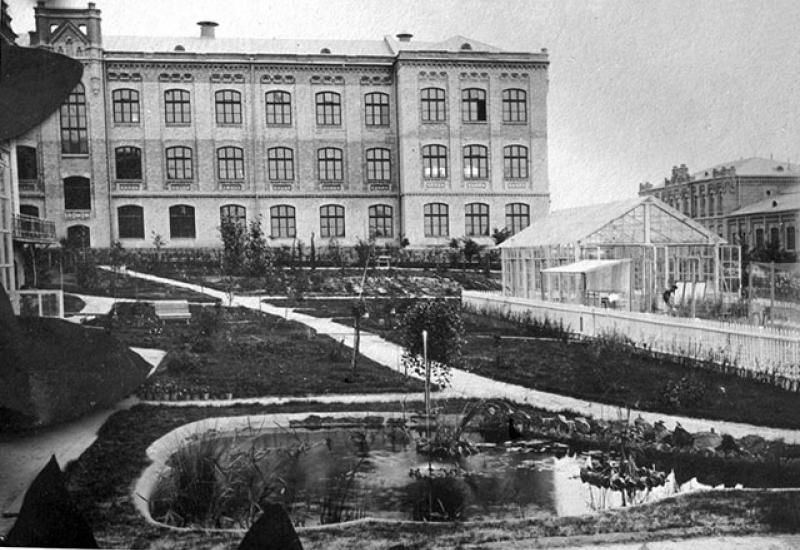August 31, 1898 has gone down in history as the birthday of our glorious University. That same day, the first director of the KPI Professor Victor L. Kirpichev during celebrations at the opening of the Kyiv Polytechnic Institute of Emperor Alexander II made a famous speech "Vivat, crescat, floreat!", which defined the main objectives of the institution. "Polytechnic Institute is a higher technical institution for the training of engineers, that is, as the name implies, the people of genius, able to invent and establish new. With the concept of operations engineer must combine the demands of creativity and construction activities, the ability to do something new ".
The project to create KPI - from idea to actual implementation - accompanied by outstanding personalities: politicians, industrialists and scientists. Honor to them for all ages!
The objective processes of industrialization of Ukraine and especially its south-western part of the middle and second half of the XIX century led to significant changes in the industrial cities face. In particular this applied to Kyiv. The essence of these changes was not only quantitative growth of industrial enterprises, indicating a revival of economic life, but also the qualitative transition to the factory stage of industrial development. Large mechanized factories, equipped with advanced while steam engines displace manufactory small businesses with manual labor. Industry contributed to the development of an updated construction of railways, spurred the creation of new enterprises metalworking, engineering and other industries.
There were among these companies: factories Turner, Schantz, Grether. Last after the establishment of the company Grether, Krivanek & Co. has expanded and increased its range of products.
In other large industrial enterprises of the period necessary to attribute the plant "Arsenal" and the Kyiv railway workshops, equipped with fifteen steam engines and the number of workers 1,800 people.
Generally, in the 90s years in Kyiv, there were 125 industrial enterprises, which employed 5970 workers. According to engineering plants, there were eight of them in Kyiv.
Since the late 80s it began to observe the process of monopolization of industrial production. For example, in April 1887, the Sugar Syndicate arose, bringing together most of the country's sugar mills. It was headed by VA Bobrinsky. In addition, there were actively created joint stock companies in the engineering, light and food industries.
However, against the background of strong growth industry there was an acute shortage of highly qualified technical specialists. And this need was growing every day.
Kharkiv Institute of Technology and the University of Kyiv, Kharkiv and Odesa, where there were the Department of Technology, which produces specialist engineers, filled this gap with all their possibilities. But it was not enough.
"All directors of higher education institutions overwhelmed with requests to send engineers. But we are not able to meet those requests," - said about the problem of training specialists, engineers, Professor V.L. Kirpichev on theCommerce and Industry Congress in 1896. So, clearly it was raised the question of need to open in the south-western region of the Russian Empire higher technical educational institutions.
Opinion on the establishment in Kyiv higher technical educational institutions there have begun aggressively put ahead the leading figures of the time - representatives of the scientific, industrial and political elite.
Here is what was written, for example, in the newspaper "Kievlianin" on October 2, 1896: "... October 1, 1896 on 11:00 am express train Southwestern Railways arrived in Kyiv with the Minister of Finance of the Russian Empire State Secretary Sergei Witte on board. In his speech upon the greetings deputations from the Kyiv City Department of Sergei Yul'evich drew attention to the fact that the growth of industry and the needs of agriculture land, is booming, highlighted the organization in southern Russia Technical High School, and the government should strive to make it open in the Kyiv ... "
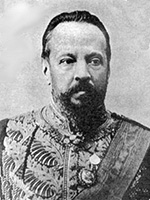 Sergei Yul'evich Witte
Sergei Yul'evich Witte
Famous statesman, Minister of Finance since 1892, Chairman of the Cabinet of Ministers since 1903 S.Y. Witte strongly supported the development of higher education in the country - many institutions have been organized on his initiative and with the support of Ministry of Finance.
As finance minister, SY Witte pursued a policy of attracting foreign capital into the domestic economy by influencing the development of banks, stock exchanges, communications and the like.
His monetary reform provided an opportunity for the first time in the country to introduce the gold currency.
As a politician, Sergei Yul'evich was an advocate of the monarchy, led the fight against the revolutionary movement.
He was the author of "Manifesto 1905", initiated the convening of the State Duma and provided some political freedom, hoping to appease the revolutionary-minded part of society.
Witte was signed the Portsmouth Peace Treaty, under which Japan got the property of the southern half of Sakhalin Island.
Ideas S.Y. Witte on private land have been implemented in reforms that later were carried out by P.A. Stolypin.
The climax of educational policy Witte was the creation of the Polytechnic Institute in Kyiv, Warsaw, St. Petersburg. On the organization of higher technical educational institutions Witte wrote: "By developing a network of business education, I had the idea to organize the higher institutions - commercial and technical universities as polytechnics, which would contain a different branch of human knowledge, but should have an organization of universities, technical schools, ie an organization that has been able to develop the most young people, giving them universal knowledge as a result of communication with friends who engaged in all possible fields. I was created with the help of my staff the statut of the St. Petersburg Polytechnic Institute, which is now one of the main institutions of higher education of St. Petersburg. This charter was held by the Council of State not without complications. This Polytechnic Institute in St. Petersburg, a mechanical and chemical separation and division of shipbuilding. I treated this matter with full enthusiasm, resulting in I was able to arrange a Polytechnic Institute perfectly. During my tenure as Minister of Finance, I was, of course, easier than other ministers, have the means to the organization of this institution. In addition to the St. Petersburg Polytechnic Institute in those days, when I was Minister of Finance, approximately in the same way I was able to organize two polytechnic colleges: one in Warsaw and one in Kyiv. "
Since 1898, Sergei Witte - an honorary member of the Kyiv Polytechnic Institute.
Idea put forward by the Minister of Finance S.Y. Witte, was strongly supported in Kyiv. Already 9 November 1896 at the meeting of the Finance Committee in the town council known entrepreneur, a member of the Exchange Committee Lazar Brodsky was stated that in the interests of beet-sugar industry is important to aim for opening in Kyiv higher technical institutions.
A November 25, 1896, chaired by the mayor Professor of Philosophy Kyiv Theological Academy, a progressive democratic leader of that time Stepan Mykhailovych Solski there was held the first private meeting, the purpose of which was to agree on the views of the city authorities and the Exchange Committee of the nature of the future of the institution. The meeting was held in the apartment of the famous sugar manufacturer Lazar Brodsky.
This particular meeting was attended by Professors of Kyiv University of St. Vladimir: Bunge, Bogdanov, Bubnov, de Metz, Pikhno, Rachmaninoff, Rennenkampf, assistant professor Samofalov; Railway Engineers: Abragamson, fon Gershelman, Nemeshaev, Filonenko; process engineers: Barsukov, Tolpigin, Fishman; industry representatives Lazar Brodsky, Podhorsky, Ratgauz, B.Hanenko, Hriakov, Scheniovsky.
The decision of the private meeting was formalized by protocol. Paragraph 3 of this protocol gave the main conclusion: "... to create a new higher technical educational institution must be recognized by all as an urgent need."
In the future fate of the future of the Kyiv Polytechnic Nikolai A. Bunge, Georgy De Metz, Lazar Brodsky, Stepan Mikhailovich Solskiy Nicholas Artemovich Tereshchenko played a very important role.
The question of establishing technical educational institution in the south-western region of the Russian Empire at the end of the XIX century did not emerge spontaneously. The need for opening was, above all, the urgent need of local specialists for various industries. First of all, in the opening of such an institution there were interested entrepreneurs, owners of factories, railroad. In 1880 the Kyiv listed companies and representatives of the owners of sugar factories in honor of the 25th anniversary of the reign of Emperor Alexander II opened membership to the organization in Kyiv secondary technical institutions. This is the first financial campaign in favor of the institution gave 20,800 rubles. Later, namely in 1882, listed companies for the same purpose has donated 20,500 rubles. In 1888, the fund added another 300 rubles given by an outstanding artist Aivazovsky. By 1896, the fund amounted to 72,000 rubles. That it turned its attention SY Witte, putting forward the idea of creating higher technical educational institution in Kyiv.
After the adoption of the "political" decision (November 25 1896) on the need to create in Kyiv higher technical educational institution above mentioned fund started to be actively growing.
Already 2 December 1896 Kyiv City Council decided with the majority of votes monetary support for the organization Polytechnic Institute allocated 300,000 rubles.
The substantial financial aid for the organization KPI were given by the outstanding entrepreneurs like Nicholas Artemovich Tereshchenko and Lazar Brodsky, private contributions of them were 150,000 and 100,000 rubles respectively.
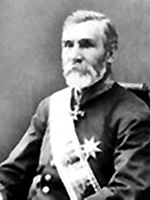 Nikolai Artemyevitch Tereshchenko
Nikolai Artemyevitch Tereshchenko
Nikolai Artemyevitch Tereshchenko had a sharp wit and original nature: prudence and foresight combined with courage and a rare ability to charity, and its charitable activities indicative of loving kindness and humanity.
Nicholai Artemovich was born in Glukhiv 26/10/1819. He received his primary education at a local college, then he began commercial affairs. From 1851 he served as deputy mayor of Glukhiv, from 1860 - the mayor, and with the introduction of Chernihiv province zemstvo is selected provincial vowel. Having assessed properly wealth Southwestern Region, in the early 70-ies Nikolai Artemovich moved to Kyiv and immediately took first place in the commercial world.
His social activities is a broad and intelligent philanthropy. A significant number of buildings in Kyiv were built thanks to his donations. Such are temples Vladimir, St. Nicholas Cathedral, Kyiv-Pechersk Lavra. He donated 5 million rubles for them.For hospital for laborers - 600 thousand rubles, The Red Cross Hospital - 100 thousand rubles, Pecher gymnasium -100 thousand rubles, Industrial and Art School - 150 thousand rubles, Chamber of Commerce - 300 thousand rubles, the Museum of Antiquities and Arts - 100 thousand rubles.
This is not an exhaustive list, of course, can not give an idea of the extremely large charitable activities of this prominent industrialist and philanthropist - "Old Mykola", as in those days he was called by the people of Kyiv.
His passion for art and his family gave the city a priceless collection of works that are available today in the Kyiv Museum of Russian Art - the former estate Tereshchenko. Kyiv can thank him for his numerous educational institutions, among them our Polytechnic Institute.
N.A. Tereshchenko died 02.01.1903 in Kyiv, he was buried in Glukhov. His name was given to the street in Kyiv, where there are majority of his homes
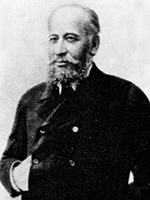 Lazar Brodsky
Lazar Brodsky
Grandfather Lazar named Meir Shor was a resident of the city of Brody. At the beginning of the XIX century he moved to the city Zlatopol Chigirinskiy county and received the name of Brodsky. Of the five sons who were with him, Israel was the most successuful. It was he who in 1846 founded in the village Lebedin (near Zlatopol) its first sugar refinery. Initiated work was continued by his sons Leo and Lazarus. In the early twentieth century under their leadership there were already 6 joint-stock companies, which included 10 sugar beet and three refineries.
The brothers Lazar and Leo inherited from his father not only entrepreneurial spirit but also a sense of social needs. For example, Lazar Brodsky was one of the founders and became chairman of the Company's fight against infectious diseases, built in the village Pushcha Voditsa (now part of Kyiv) sanatorium for tuberculosis patients. In 1896, at his expense in Kyiv it was created a modern at the time bacteriological institute, and August 24, 1898 it was consecrated Choral Synagogue, built in Kyiv at his own expense.
In the architectural appearance of Kyiv there were stand out the other buildings erected in whole or in part by means of Lazarus and Lev Brodsky. And yet all generations Kyiv Polytechnic owe Lazar Brodsky. Through his active participation there have been resolved issues about creating the Kyiv Polytechnic Institute, its construction and maintenance of the early academic years.
Lazar Brodsky was born in 1848 in Zlatopol. Died October 2, 1904 in the Swiss city of Basel.
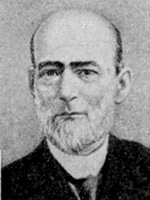 Nikolai Andreyevich Bunge
Nikolai Andreyevich Bunge
N.A.Bunge was born 3 (15) December 1842 in Warsaw, but since 14 years old he lived and educated in Kyiv in the family of his uncle M.H.Bunge. Graduating the First Kyiv Gymnasium he was enrolled student of the natural department of Physics and Mathematics Faculty of the University of St. Vladimir. He graduated it in 1865 and was retained by the university professorial Fellow. M.A.Bunge was passionately fond of chemistry, being the student completed his first scientific work, and for the period of stay Scholar withstood master's examinations and defended his thesis in 1868 on "The nitroso compounds." Being already the Master he received a trip abroad for two years, half of which he spent in Germany.
After graduating from business trips abroad M.A.Bunge began in 1871 the lecturing at the superintendence departments and laboratories of Technical Chemistry at the University of St. Vladimir.
M.A.Bunge enjoyed great prestige among professors and teachers, who have repeatedly turned to him for advice, recognizing its high prestige and experience, as well as among students. No less an authority M.A.Bunge enjoed and outside the university: together with P.P.Alekseev he was the founder of the Russian Physical and Chemical Society, and an honorary member of the Society of Naturalists, an active member of the Kyiv branch of the Russian Technical Society (headed by 33), whose chairman was elected in 1873
M.A.Bunge repeatedly stressed that the development of industry in Russia must be prepared by the "knowledgeable workers", in connection with which took care of the technical education. On his initiative it was established in the village away Kyiv province technical classes (today - college food industry), school and road construction business, trade school in Kyiv.
Professor at the University of St. Vladimir de Metz, in the future professor of the Kyiv Polytechnic Institute, wrote: "When in November 1896 in Kyiv there was the idea of establishing the Polytechnic Institute with branches, and when the issue was strictly necessary to discuss and put in a certain framework, all eyes were fixed on M.A.Bunge. And he had chaired a meeting of the Russian Technical Society, where they were finally developed curricula and architectural appearance. " M.A.Bunge offered to be the director of the Polytechnic Institute, but he refused, not wanting to leave the university.
Of course, the idea of creating the Kyiv Polytechnic held other prominent personalities of the time. Only now, after more than a hundred years, we are aware of the relevance to the needs of contemporary society, and most importantly for future generations, the importance of the hard work, which eventually led to the creation of the KPI, laid the groundwork for its formation and development. Today, on the eve of (and possibly a celebration of the 110th anniversary of Kyiv Polytechnic Institute), we gratefully bow our heads before the memory of its founder, practical wisdom which lives in the modern achievements of Kyiv Polytechnic Institute.

